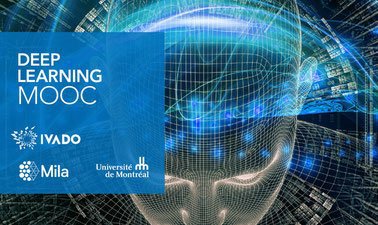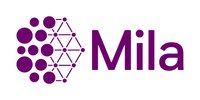Deep Learning Essentials
- Duration: 5 weeks
- Effort: 25 hours
- Pace: ~5 hours/week
Do you want to learn how machines can learn tasks we thought only human brains could perform? Then take this Deep Learning course developed by IVADO, Mila and Université de Montréal: an extensive overview of the essentials of deep learning, this ground-breaking technology already prevalent in our lives and spanning all sectors.

IVADO-DL-101+2T2025
- Enrollment
- From May 1, 2025 to April 30, 2026
- Course
- From May 1, 2025 to April 30, 2026
- Languages
- English
Description
Gain a good understanding of what Deep Learning is, what types of problems it resolves, and what are the fundamental concepts and methods it entails. The course developed by IVADO, Mila and Université de Montréal offers diversified learning tools for you to fully grasp the extent of this ground-breaking cross-cutting technology, a critical need in the field.
IVADO, a scientific and economic data science hub bridging industrial, academic and government partners with expertise in digital intelligence designed the course, and the world-renowned Mila, rallying researchers specialized in Deep Learning, created the content.
This course is based on presentations from an event held in Montreal, from September 9 to 13, 2019. It was adapted to an online course (MOOC) format and was released, for the first time, in March 2020. The tutorials' material was updated on Colab Notebook in Spring of 2021.
Mila’s founder and IVADO’s scientific director, Yoshua Bengio, also a professor at Université de Montréal, is a world-leading expert in artificial intelligence and a pioneer in deep learning as well as the scientific director of this course. He is also a joint recipient of the 2018 A.M. Turing Award, “the Nobel Prize of Computing”, for conceptual and engineering breakthroughs that have made deep neural networks a critical component of computing.
Deep Learning is an extension of Machine Learning where machines can learn by experience without human intervention. It is largely influenced by the human brain in the fact that algorithms, or artificial neural networks, are able to learn from massive amounts of data and acquire skills that a human brain would. Thus, Deep learning is now able to tackle a large variety of tasks that were considered out of reach a few years ago in computer vision, signal processing, natural language processing, robotics, and sequential decision-making. Because of these recent advances, various industries are now deploying deep learning models that impact various economic sectors such as transport, health, finance, energy, as well as our daily life in general.
If you are a professional, a scientist or an academic with basic knowledge in mathematics and programming, this MOOC is designed for you! Atop the rich Deep Learning content, discover issues of bias and discrimination in machine learning and benefit from this sociotechnical topic that has proven to be a great eye-opener for many.
What you'll learn
At the end of the MOOC, participants should be able to:
- Understand the basics and terminology related to Deep Learning
- Identify the types of neural networks to use to solve different types of problems
- Get familiar with Deep Learning libraries through practical and tutorial sessions
Syllabus
MODULE 1 Machine Learning (ML) and Experimental Protocol
- Introduction to ML
- ML Tools
MODULE 2 Introduction to Deep Learning
- Modular Approaches
- Backpropagation
- Optimization
MODULE 3 Intro to Convolutional Neural Networks (CNN)
- Introduction to CNN
- CNN Architectures
MODULE 4 Introduction to Recurrent Neural Networks
- Sequence to Sequence Models
- Concepts in Natural Language Processing
MODULE 5 Bias and Discrimination in ML
- Differences of Fairness
- Fairness in Pre- In- and Post-Processing
Other course runs
Archived
- DL101x-H2021, enrollment from Jan. 7, 2021 to Feb. 11, 2021
- IVADO-DL-101+1T2023, enrollment from April 8, 2024 to April 30, 2025
Course team
Bronzi, Mirko
Categories
Applied Research Scientist
Mirko Bronzi‘s PhD dealt with extracting and integrating information from different web sources. He is interested in Natural Language Processing for car virtual assistants and on Clinical Language Understanding for doctor/patient interaction.
Marceau Caron, Gaétan
Categories
Applied Research Scientist
Gaétan Marceau Caron joined Mila in 2017. From 2014 to 2016, he was a postdoctoral researcher at INRIA-Saclay. He received a Ph.D. in Computer Science from Paris-Sud XI University in 2014.
Pinto, Jeremy
Categories
Applied Research Scientist
Jeremy is an applied research scientist at Mila. He has a BSc in engineering physics at Polytechnique Mtl and holds a MSc in systems design engineering from U Waterloo. He also has experience from implementing machine learning projects in industry.







